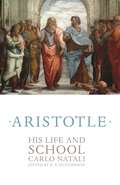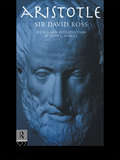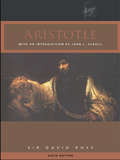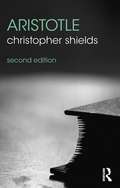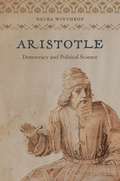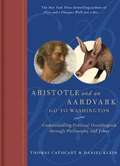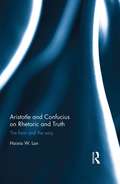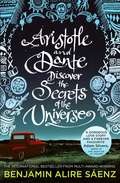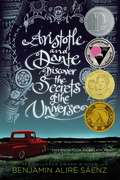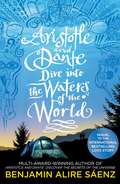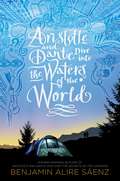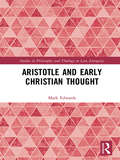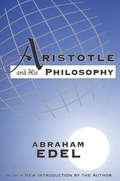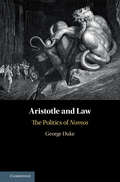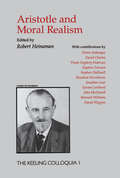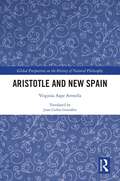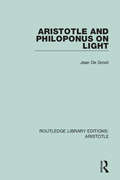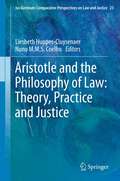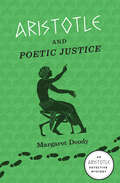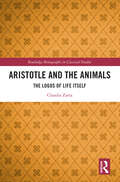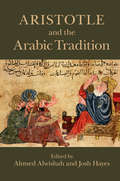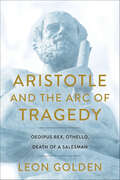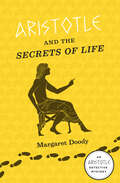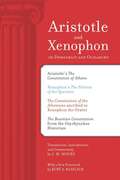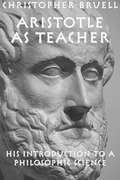- Table View
- List View
Aristotle: His Life and School
by Carlo NataliThe definitive account of Aristotle's life and schoolThis definitive biography shows that Aristotle's philosophy is best understood on the basis of a firm knowledge of his life and of the school he founded. First published in Italian, and now translated, updated, and expanded for English readers, this concise chronological narrative is the most authoritative account of Aristotle's life and his Lyceum available in any language. Gathering, distilling, and analyzing all the evidence and previous scholarship, Carlo Natali, one of the world's leading Aristotle scholars, provides a masterful synthesis that is accessible to students yet filled with evidence and original interpretations that specialists will find informative and provocative.Cutting through the controversy and confusion that have surrounded Aristotle's biography, Natali tells the story of Aristotle's eventful life and sheds new light on his role in the foundation of the Lyceum. Natali offers the most detailed and persuasive argument yet for the view that the school, an important institution of higher learning and scientific research, was designed to foster a new intellectual way of life among Aristotle's followers, helping them fulfill an aristocratic ideal of the best way to use the leisure they enjoyed. Drawing a wealth of connections between Aristotle's life and thinking, Natali demonstrates how the two are mutually illuminating.For this edition, ancient texts have been freshly translated on the basis of the most recent critical editions; indexes have been added, including a comprehensive index of sources and an index to previous scholarship; and scholarship that has appeared since the book's original publication has been incorporated.
Aristotle: De Anima
by David RossSir David Ross was one of the most distinguished and influential Aristotelians of this century; his study has long been established as an authoritative survey of the life, work and philosophy of Aristotle.This clear and lucid account contains useful summaries of theories and arguments, with brief, suggestive critical comments. Aristotle's work encompassed all the branches of science and learning which were central to the intellectual life of the ancient world: logic, the philosophy of nature, biology, psychology, metaphysics, ethics, politics, rhetoric and poetics. Aristotle's borrowings from his predecessors, and his own fundamental influence on later philosophy, are also examined. Important Greek terms in Aristotle's work are explained and discussed.Aristotle is now re-issued with a new introduction by John L. Ackrill, which reviews developments in Aristotelian studies since Sir David Ross originally wrote his classic study. The bibliography has been supplemented by references to recent works. Both students of philosophy and general rea ders will find the volume an indispensable guide to Aristotle's thought.
Aristotle
by Sir David RossWritten by renowned Aristotle scholar Sir David Ross, this study has long been established as one of the foremost surveys of Aristotle's life, work and philosophy. With John L. Ackrill's introduction and updated bibliography, created for the sixth edition, the book continues to serve as a standard guide, both for the student of ancient history and the general reader.
Aristotle (The Routledge Philosophers)
by Christopher ShieldsIn this extensively revised new edition of his excellent guidebook, Christopher Shields introduces the whole of Aristotle’s philosophy, showing how his powerful conception of human nature shaped much of his thinking on the nature of the soul and the mind, ethics, politics, and the arts. Beginning with a brief biography, Shields carefully explains the fundamental elements of Aristotle’s thought: his explanatory framework, his philosophical methodology, and his four-causal explanatory scheme. Subsequently he discusses Aristotle’s metaphysics, the theory of categories, logical theory, and his conception of the human being as a composite of soul and body. The last part concentrates on Aristotle’s value theory as applied to ethics and politics, and assesses his approach to happiness, virtue, and the best life for human beings, before turning to a consideration of Aristotle's theory of rhetoric and the arts, with a special focus on his perennially controversial treatment of tragedy. This second edition includes an expanded discussion of Aristotle's method, and new sections on key issues in perception, thought, akrasia, and mimesis. It concludes with an expanded assessment of Aristotle's legacy, sketching currently emerging Neo-Aristotelian movements in metaphysics and virtue ethics.
Aristotle: Democracy and Political Science
by Delba WinthropToday, democracy is seen as the best or even the only legitimate form of government—hardly in need of defense. Delba Winthrop punctures this complacency and takes up the challenge of justifying democracy through Aristotle’s political science. In Aristotle’s time and in ours, democrats want inclusiveness; they want above all to include everyone a part of a whole. But what makes a whole? This is a question for both politics and philosophy, and Winthrop shows that Aristotle pursues the answer in the Politics. She uncovers in his political science the insights philosophy brings to politics and, especially, the insights politics brings to philosophy. Through her appreciation of this dual purpose and skilled execution of her argument, Winthrop’s discoveries are profound. Central to politics, she maintains, is the quality of assertiveness—the kind of speech that demands to be heard. Aristotle, she shows for the first time, carries assertive speech into philosophy, when human reason claims its due as a contribution to the universe. Political science gets the high role of teacher to ordinary folk in democracy and to the few who want to understand what sustains it. This posthumous publication is more than an honor to Delba Winthrop’s memory. It is a gift to partisans of democracy, advocates of justice, and students of Aristotle.
Aristotle and an Aardvark Go to Washington: Understanding Political Doublespeak Through Philosophy and Jokes
by Thomas Cathcart Daniel KleinThomas Cathcart and Daniel Klein, authors of the national bestseller Plato and a Platypus Walk into a Bar, aren't falling for any election year claptrap--and they don't want their readers to either! In Aristotle and an Aardvark Go to Washington, our two favorite philosopher-comedians return just in time to save us from the double-speak, flim-flam, and alternate reality of politics in America. Deploying jokes and cartoon as well as the occasional insight from Aristotle and his peers, Cathcart and Klein explain what politicos are up to when they state: "The absence of evidence is not the evidence of absence." (Donald Rumsfeld), "It depends on what the meaning of the word 'is' is. " (Bill Clinton), or even, "We hold these truths to be self-evident..." (Thomas Jefferson, et al). Drawing from the pronouncements of everyone from Caesar to Condoleeza Rice, Genghis Kahn to Hillary Clinton, and Adolf Hitler to Al Sharpton. Cathcart and Klein help us learn to identify tricks such as "The Texas Sharpshooter Fallacy" (non causa pro causa) and the "The Fallacy Fallacy" (argumentum and logicam). Aristotle and an Aardvark is for anyone who ever felt like the politicos and pundits were speaking Greek. At least Cathcart and Klein provide the Latin name for it (raudatio publica)!
Aristotle and Confucius on Rhetoric and Truth: The Form and the Way
by Haixia LanThe current study argues that different cultures can coexist better today if we focus not only on what separates them but also on what connects them. To do so, the author discusses how both Aristotle and Confucius see rhetoric as a mode of thinking that is indispensable to the human understanding of the truths of things or dao-the-way, or, how both see the human understanding of the truths of things or dao-the-way as necessarily communal, open-ended, and discursive. Based on this similarity, the author aims to develop a more nuanced understanding of differences to help foster better cross-cultural communication. In making the argument, she critically examines two stereotyped views: that Aristotle’s concept of essence or truth is too static to be relevant to the rhetorical focus on the realm of human affairs and that Confucius’ concept of dao-the-way is too decentered to be compatible with the inferential/discursive thinking. In addition, the author relies primarily on the interpretations of the Analects by two 20th-century Chinese Confucians to supplement the overreliance on renderings of the Analects in recent comparative rhetorical scholarship. The study shows that we need an in-depth understanding of both the other and the self to comprehend the relation between the two.
Aristotle and Dante Discover the Secrets of the Universe: The multi-award-winning international bestseller
by Benjamin Alire SáenzThe beloved cult classic about family, friendship and first love, from award-winning author Benjamin Alire Sáenz. This lyrical novel will enrapture readers of Adam Silvera (They Both Die at the End), The Perks of Being a Wallflower and Call me by your Name. Aristotle is an angry teen with a brother in prison.Dante is a know-it-all who has a unique perspective on life. When the two meet at the swimming pool, they seem to have nothing in common. But as the loners start spending time together, they develop a special friendship – the kind that changes lives and lasts a lifetime. And it is through this friendship that Ari and Dante will learn the most important truths about the universe, themselves and the kind of people they want to be.This incredibly moving and powerful Printz Honor Book follows two teen boys learning to open themselves up to love, despite the world being against them. 'A tender, honest exploration of identity' – Publishers Weekly
Aristotle and Dante Discover the Secrets of the Universe (Aristotle and Dante)
by Benjamin Alire SáenzNow a major motion picture starring Max Pelayo, Reese Gonzales, and Eva Longoria! <br> A Time Best YA Book of All Time (2021) <br> This Printz Honor Book is a “tender, honest exploration of identity” (Publishers Weekly) that distills lyrical truths about family and friendship. Aristotle is an angry teen with a brother in prison. Dante is a know-it-all who has an unusual way of looking at the world. When the two meet at the swimming pool, they seem to have nothing in common. But as the loners start spending time together, they discover that they share a special friendship—the kind that changes lives and lasts a lifetime. And it is through this friendship that Ari and Dante will learn the most important truths about themselves and the kind of people they want to be.
Aristotle and Dante Dive Into the Waters of the World: The highly anticipated sequel to the multi-award-winning international bestseller Aristotle and Dante Discover the Secrets of the Universe
by Benjamin Alire SáenzThe highly anticipated sequel to the beloved cult classic about family, friendship and first love, from award-winning author Benjamin Alire Sáenz. This lyrical novel will enrapture readers of John Green, Love, Simon and Call me by your Name. A love story like no other. In Aristotle and Dante Discover the Secrets of the Universe, two boys fell in love. Now they must discover what it means to stay in love and build a relationship in a world that seems to challenge their very existence.Ari has spent all of high school hiding who he really is, staying silent and invisible. He expected his senior year to be the same. But something in him cracked open when he fell in love with Dante, and he can&’t go back. Suddenly he finds himself reaching out to new friends, standing up to bullies and making his voice heard. And, always, there is Dante – dreamy, witty Dante – who can get on Ari&’s nerves and fill him with desire all at once. The boys are determined to forge a path for themselves in a world that doesn&’t understand them. But when Ari is faced with a shocking loss, he&’ll have to fight like never before to create a life that is truthfully, joyfully his own.
Aristotle and Dante Dive into the Waters of the World (Aristotle and Dante)
by Benjamin Alire SáenzThe highly anticipated sequel to the critically acclaimed, multiple award-winning novel Aristotle and Dante Discover the Secrets of the Universe is an achingly romantic, tender tale sure to captivate fans of Adam Silvera and Mary H.K. Choi. <p><p> In Aristotle and Dante Discover the Secrets of the Universe, two boys in a border town fell in love. Now, they must discover what it means to stay in love and build a relationship in a world that seems to challenge their very existence. Ari has spent all of high school burying who he really is, staying silent and invisible. He expected his senior year to be the same. But something in him cracked open when he fell in love with Dante, and he can’t go back. Suddenly he finds himself reaching out to new friends, standing up to bullies of all kinds, and making his voice heard. And, always, there is Dante, dreamy, witty Dante, who can get on Ari’s nerves and fill him with desire all at once. <p><p> The boys are determined to forge a path for themselves in a world that doesn’t understand them. But when Ari is faced with a shocking loss, he’ll have to fight like never before to create a life that is truthfully, joyfully his own.
Aristotle and Early Christian Thought (Studies in Philosophy and Theology in Late Antiquity)
by Mark EdwardsIn studies of early Christian thought, ‘philosophy’ is often a synonym for ‘Platonism’, or at most for ‘Platonism and Stoicism’. Nevertheless, it was Aristotle who, from the sixth century AD to the Italian Renaissance, was the dominant Greek voice in Christian, Muslim and Jewish philosophy. Aristotle and Early Christian Thought is the first book in English to give a synoptic account of the slow appropriation of Aristotelian thought in the Christian world from the second to the sixth century. Concentrating on the great theological topics – creation, the soul, the Trinity, and Christology – it makes full use of modern scholarship on the Peripatetic tradition after Aristotle, explaining the significance of Neoplatonism as a mediator of Aristotelian logic. While stressing the fidelity of Christian thinkers to biblical presuppositions which were not shared by the Greek schools, it also describes their attempts to overcome the pagan objections to biblical teachings by a consistent use of Aristotelian principles, and it follows their application of these principles to matters which lay outside the purview of Aristotle himself. This volume offers a valuable study not only for students of Christian theology in its formative years, but also for anyone seeking an introduction to the thought of Aristotle and its developments in Late Antiquity.
Aristotle and His Philosophy
by Abraham EdelIn this stunning act of synthesis, Abraham Edel captures the entire range of Aristotle's thought in a manner that will prove attractive and convincing to a contemporary audience. Many philosophers approach Aristotle with their own, rather than his, questions. Some cast him as a partisan of a contemporary school. Even the neutral approach of classical scholarship often takes for granted questions that reflect our modern ways of dissecting the world.Aristotle and His Philosophy shows him at work in asking and answering questions. Abraham Edel fashions a sound comparative way of using current analysis to deepen our understanding of Aristotle rather than argue with or simply appropriate him. Edel examines how Aristotle's basic ideas operated in his scientific and humanistic works, what they enabled him to do, what they kept him from doing, and what in turn we can learn from his philosophical experimentation.The purpose of this volume is twofold: to provide a comprehensive introduction to Aristotle's thought, and to throw fresh light on its patterned and systematic character. First, tracing the pattern in Aristotle's metaphysical and physical writings, he then explores the psychology, epistemology, ethics and politics, rhetoric and poetics. In the process, Edel discusses the way interpretations of Aristotle are built up and how different philosophical outlooks Catholic, Hegelian, Marxian, linguistic, naturalistic, and pragmatic have affected the reading of Aristotelian texts and ideas.The new introduction probes the general problem of interpreting a philosophy, and suggests how working through the different interpretations can contribute to a fuller understanding. This methodological self-consciousness makes Aristotle and His Philosophy markedly different from other studies of Aristotle. Martha C. Nussbaum of Brown University has described Edel as having "philosophical sensitivity and good sense throughout. His scholarship is comprehensive, but handled with grace and clarity."
Aristotle and Law: The Politics of Nomos
by George DukeIn Aristotle and Law, George Duke argues that Aristotle's seemingly dispersed statements on law and legislation are unified by a commitment to law's status as an achievement of practical reason. This book provides a systematic exposition of the significance and coherence of Aristotle's account of law, and also indicates the relevance of this account to contemporary legal theory. It will be of great interest to scholars and students in jurisprudence, philosophy, political science and classics.
Aristotle And Moral Realism: The Proceedings Of The First Keeling Colloquium, University College London, February 1994 (Keeling Colloquia Ser. #Vol. 1)
by Robert A HeinamanThe question of moral realismwhether our ethical beliefs rest on some objective foundationis one that mattered as much to Aristotle as it does to us today, and his writings on this topic continue to provide inspiration for the contemporary debate. This volume of essays expands the fruitful conversation among scholars of ancient philosophy and contemporary ethical theorists on this question and related issues such as the virtues, justice, and Aristotles theory of tragedy. }The question of moral realismwhether our ethical beliefs rest on some objective foundationis one that mattered as much to Aristotle as it does to us today, and his writings on this topic continue to provide inspiration for the contemporary debate. This volume of essays expands the fruitful conversation among scholars of ancient philosophy and contemporary ethical theorists on this question and related issues such as the virtues, justice, and Aristotles theory of tragedy. The distinguished contributors to this volume enrich and clarify both Aristotles views and the contemporary debates. This book makes an important contribution to both topics, and it will be essential reading for all philosophers and classicists with an interest in moral philosophy and Greek ethics.
Aristotle and New Spain (Global Perspectives on the History of Natural Philosophy)
by null Virginia Aspe ArmellaThis book is a detailed exploration of the Hispanic intellectual context and the different Aristotelian traditions that prevailed until the 16th century. Through a review and contextualisation of Aristotelian thinkers and texts, it argues that a unique Aristotelian tradition was formed in New Spain.The characteristic differences of Novohispanic Aristotelianism are a consequence of five factors: contact with the autochthonous cultures of America, the impact of the colonial organisation, the influence of the Salamanca humanist tradition, the presence of the Italian Aristotelianism of Renaissance translators in the university curricula and in the intellectual polemics of the time, and a peculiar assimilation of primitive and Old Testament Christianity in relation to indigenous people. This book analyses the works of Alonso de la Veracruz, Bartolomé de las Casas, Bernardino de Sahagún, Sor Juana Inés de la Cruz, Carlos de Sigüenza y Góngora, and Francisco Xavier Clavijero, reconsidering them in light of the history of ideas in New Spain and the contributions of Byzantine translators. It also offers a reflection on the problem of addressing Mexican colonial sources.This volume will be of interest to undergraduate and postgraduate philosophy students, as well as to researchers focused on Aristotle, Renaissance philosophy, or Latin American studies.
Aristotle and Philoponus on Light (Routledge Library Editions: Aristotle #3)
by Jean De GrootOriginally published in 1991. Philoponus’ long commentary on Aristotle’s definition of light sets up the major concerns, both in optics and theory of light, that are discussed here. Light was of special interest in Neoplatonism because of its being something incorporeal in the world of natural bodies. Light therefore had a special role in the philosophical analysis of the interpenetration of bodies and was also a paradigm for the soul-body problem. The book contains much about the physiology of vision as well as the propagation of light. Several chapters investigate the philosophical theory behind what came to be known as ‘multiplication of species’ in medieval light theory. These issues in the history of science are placed within an analysis of Neoplatonic development of the distinction between Aristotle’s kinesis and energeia. The book treats Philoponus’ philosophy of mathematical science from the point of view of matter, quantity, and three-dimensionality.
Aristotle and The Philosophy of Law: Theory, Practice And Justice (Ius Gentium: Comparative Perspectives on Law and Justice #23)
by Nuno M.M.S. Coelho Liesbeth Huppes-CluysenaerThe book presents a new focus on the legal philosophical texts of Aristotle, which offers a much richer frame for the understanding of practical thought, legal reasoning and political experience. It allows understanding how human beings interact in a complex world, and how extensive the complexity is which results from humans' own power of self-construction and autonomy. The Aristotelian approach recognizes the limits of rationality and the inevitable and constitutive contingency in Law. All this offers a helpful instrument to understand the changes globalisation imposes to legal experience today. The contributions in this collection do not merely pay attention to private virtues, but focus primarily on public virtues. They deal with the fact that law is dependent on political power and that a person can never be sure about the facts of a case or about the right way to act. They explore the assumption that a detailed knowledge of Aristotle's epistemology is necessary, because of the direct connection between Enlightened reasoning and legal positivism. They pay attention to the concept of proportionality, which can be seen as a precondition to discuss liberalism.
Aristotle and Poetic Justice: An Aristotle Detective Novel (The Aristotle Detective Novels #2)
by Margaret DoodyThe great Greek philosopher heads to Delphi on the hunt for a kidnapped heiress in this series of &“witty, elegant whodunits&” (Times Literary Supplement). 330BC: Alexander the Great has sacked Persepolis and won the greatest fortune the world has ever known. The night of the Silent Dinner, when Athens placates the spirits of the dead, passes with a creeping mist accompanied by eerie portents and a strange disappearance. Stephanos and his teacher, the philosopher Aristotle, are about to be drawn into solving the perplexing abduction case of Anthia, the heiress of a prominent silver merchant. All that is known is that the abductor and the heiress are on the road to Delphi and its ancient oracle—whose help may be needed when a murder complicates the case in this follow-up to the &“eminently enjoyable&” Aristotle Detective (Colin Dexter, author of the Inspector Morse Mysteries). &“Why did no one think of this before?&”—The Times (UK)
Aristotle and the Animals: The Logos of Life Itself (Routledge Monographs in Classical Studies)
by Claudia ZattaWith a novel approach to Aristotle’s zoology, this study looks at animals as creatures of nature (physis) and reveals a scientific discourse that, in response to his predecessors, exiles logos as reason and pursues the logos intrinsic to animals’ bodies, empowering them to sense the world and live. The volume explores Aristotle’s conception of animals through a discussion of his ad hoc methodology to study them, including the pertinence of the soul to such a study, and the rise of zoology as a branch of natural philosophy. For Aristotle, animal life stems from the body in the space of existence and revolves around sensation, which is entwined with pleasure, pain, and desire. Lack of human reason is irrelevant to an understanding of the richness of animal life and cognition. In sum, the reader will acquire knowledge of the "animal as such," which lay at the core of Aristotle’s agenda and required a study of its own, separate from plants and the elements. This book is intended for students of the history of science, ancient biology, and philosophy and all those who, from different fields, are interested in animal studies and the human-animal relation.
Aristotle and the Arabic Tradition
by Ahmed Alwishah Josh HayesThis volume of essays by scholars in ancient Greek, medieval, and Arabic philosophy examines the full range of Aristotle's influence upon the Arabic tradition. It explores central themes from Aristotle's corpus, including logic, rhetoric and poetics, physics and meteorology, psychology, metaphysics, ethics and politics, and examines how these themes are investigated and developed by Arabic philosophers including al-Kindî, al-Fârâbî, Avicenna, al-Ghazâlî, Ibn Bâjja and Averroes. The volume also includes essays which explicitly focus upon the historical reception of Aristotle, from the time of the Greek and Syriac transmission of his texts into the Islamic world to the period of their integration and assimilation into Arabic philosophy. This rich and wide-ranging collection will appeal to all those who are interested in the themes, development and context of Aristotle's enduring legacy within the Arabic tradition.
Aristotle and the Arc of the Tragedy: Oedipus Rex, Othello, Death of a Salesman
by Leon GoldenAristotle and the Arc of Tragedy is the latest of Leon Golden’s books to connect Ancient Greece to modern culture. In a world facing many pressing issues Classics professor Golden wants to champion the values and achievements of Classical Civilization. He asserts that Homeric Epic and Greek Tragedy are as relevant today as they were millennia ago because they are riveting and insightful studies of the human condition. Their universality grants them a contemporary relevance despite the passage of time and changes in custom and taste.In one of his previous books, Understanding the Iliad, Golden illuminated the relevance of The Iliad for modern readers. The Bryn Mawr Classical Review praised Understanding the Iliad because it, “achieves what it sets out to accomplish: to provide an interpretation of the Iliad that emphasizes its didactic aspects, its ability to improve its readers by presenting the spectacle of the evolution of a flawed warrior consumed by destructive anger to a legitimate hero who transcends his narcissism and grandiosity and reaches out to others and by doing so heals his own aching soul in the process.”Golden, making use of correspondence and personal contact with Joseph Heller, himself, argues convincingly in Achilles and Yossarian that Homer’s The Iliad exerted a profound influence over Heller as he wrote his modern classic, Catch-22. A Kirkus review acclaims Achilles and Yossarian in these words: “Golden combines impressive erudition with a sharp critical eye and a lucid prose style that laymen will find accessible and engaging. The result is an original and persuasive work of literary scholarship that finds much more than mere war stories in these classics.”
Aristotle and the Secrets of Life: An Aristotle Detective Novel (The Aristotle Detective Novels #3)
by Margaret DoodyThe great philosopher and his student face pirates, political intrigue, and more in this dark, suspenseful mystery set in ancient Athens. Tensions between the Athenians and the Makedonians—whose leader, Alexander the Great, is one of Aristotle&’s former students—draw the philosopher across the Aegean Sea, accompanied by the devoted Stephanos. Both will have much to learn about survival as they find themselves beset by pirates, uncovering conspiracy, and facing the horrors of war. It will be up to Aristotle to try to shed light on the darkness they are about to encounter—in this novel in the historical series praised as &“unusually authentic&” (Kirkus Reviews) and &“eminently enjoyable&” (Colin Dexter, author of the Inspector Morse Mysteries). Also published as Aristotle and the Mystery of Life
Aristotle and Xenophon On Democracy and Oligarchy
by J. M. MooreThis collection contains: Aristotle's "The Constitution of Athens"; Xenophon's "The Politeia of the Spartans"; "The Constitution of the Athenians" ascribed to Xenophon the Orator; and, "The Boeotian Constitution" from the Oxyrhynchus Historian. In bringing together, translating, and annotating these constitutional documents from ancient Greece thirty-five years ago, J.M. Moore produced an authoritative work of the highest scholarship. There is an explanatory essay by classics scholar Kurt A. Raaflaub that expands this indispensable collection.
Aristotle As Teacher: His Introduction To A Philosophic Science
by Christopher BruellThis book is an account of Aristotle's Metaphysics. The work is considered as a whole and each of its parts or books is taken up in the order that it has in the traditional text. The book is based on an examination of all of the manuscript readings reported in the three most recent editions of the work (those of Christ, Ross, and Jaeger), and it attempts in this way and others to come as close as possible to what would have been the original text. The Metaphysics is of course a much-studied work. What distinguishes this new effort to understand it is the working assumption that Aristotle presents in it his most comprehensive reflection on science: its character and aims, its foundations or presuppositions, and the obstacles or objections that constitute a challenge to its possibility. The book is thus intended to be of interest and use to at least two classes of readers: to those who have already reflected themselves on the nature of science and who have perhaps become dissatisfied with more recent attempts to establish it on a firm basis or to explain the basis on which it rests; and to beginning students who are willing to undertake a difficult task and who can be brought to see that science and philosophy were originally equivalent terms and that the effort to distinguish or separate them may have been deeply misguided. In other words, the book is meant to afford a glimpse into what philosophy originally meant.
